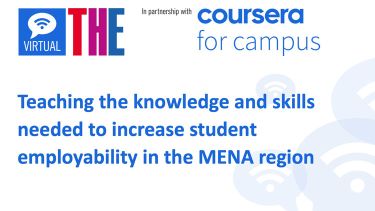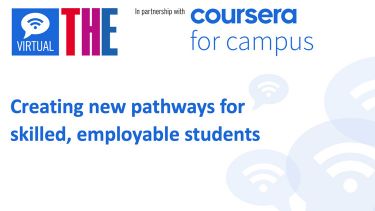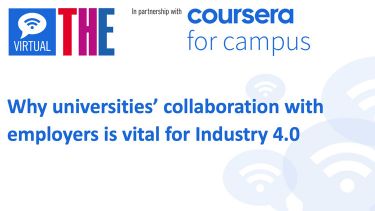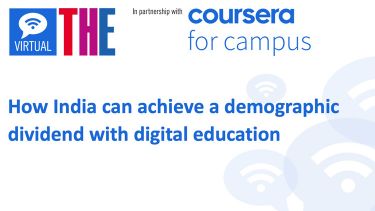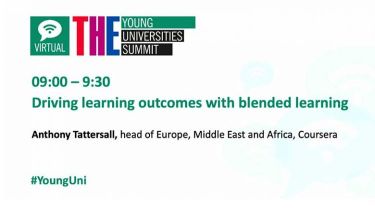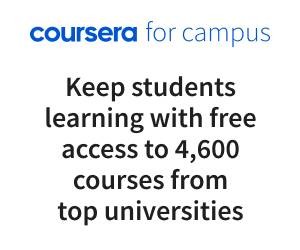Digital transformation has made it easier for universities to pursue international partnerships and collaboration, but there are still hurdles to overcome
The Covid-19 pandemic has stifled travel and in-person interactions – two key features of internationalism and collaboration. Despite the challenges, higher education institutions must continue to pursue these characteristics in order to deliver world-class teaching.
As part of a virtual round table held in partnership between Times Higher Education and Coursera for Campus, representatives from across Malaysia met to discuss how they had approached new and existing barriers to working with a collaborative and international mindset.
Eklavya Bhave, regional director at Coursera, opened the discussion noting that universities must continue their digital transformation post-pandemic. “Because technological changes happen so fast, it’s difficult for the curriculum to keep pace,” he said. “But the working market won’t wait for it to keep up, which is why we are seeing a skills gap.”
With these concerns in mind, the round table participants agreed that nurturing internationalism and gaining international partners were vital for universities to create the best possible learning space for students.
Kamila Ghazali, deputy vice-chancellor for academic and international at Universiti Malaya, said: “Even if it’s a small part of their CV, having exposure to international industries or different universities definitely enriches the student.”
While many institutions in Malaysia were already “dabbling” with international partnerships, Faisal Rafiq Mahamd Adikan, vice-chancellor of the Universiti Sains Malaysia, said that the pandemic had helped to “build some momentum, opening up people to the idea of learning online and looking to new places to study”.
There have been unexpected benefits of the forced shift to remote learning, too. Hadariah Bahron, assistant vice-chancellor of research at the Universiti Teknologi MARA (UiTM), explained that her institution’s campus is vast, spanning 34 locations. “We actually find it a lot easier now to manage our campuses and our teaching load across Malaysia,” she said. “Suddenly, teachers can be in different locations at once, so it’s making our administration and workload distribution much simpler.”
Zahiruddin Fitri Abu Hassan, senior lecturer in building surveying at the Universiti Malaya, identified a potential drawback of digital teaching platforms: "We want to be careful with online education where, if you use a MOOC platform, you are likely to end up learning alone." His institution is carefully considering how to overcome this difficulty. "The collaboration part of online course design is really important, and that is something that we really advocate and think about when we design our online courses."
Perry Hobson, pro vice-chancellor for engagement at Sunway University, agreed the pandemic has forced institutions to rethink their internationalism, potentially allowing them to adopt greener habits for the future.
Sunway works closely with Lancaster University in the UK, for example. “A lot of that closeness involved people flying around the planet,” Hobson said. “This year, I’m giving more guest lectures overseas than ever before and saving the planet a lot of CO2 in the process by doing it online.”
The need to upskill the existing workforce presented a tougher challenge that would become even more apparent post-pandemic, panellists said. Here, microcredentials can provide a solution, and many Malaysian universities are working to support their alumni further.
Adikan said his own institution was looking at forming a “consortium” with others to provide lifelong learning opportunities to graduates. “There are a lot of hurdles to be overcome in the next few years. But until we do that, we are not playing our fullest part in building the nation,” he said.
The panel:
- Rafiq Mahamd Adikan, vice-chancellor, Universiti Sains Malaysia
- Ahmad Faisal Mohamad Ayob, director of the international centre, University Malaysia Terengganu
- Hadariah Bahron, assistant vice-chancellor for research, Universiti Teknologi MARA
- Eklavya Bhave, sales lead at Coursera
- Kamila Ghazali, deputy vice-chancellor for academic and international, Universiti Malaya
- Zahiruddin Fitri Abu Hassan, senior lecturer in building surveying, Universiti Malaya
- Perry Hobson, pro vice-chancellor for engagement, Sunway University
- Chia Sien Lim, head of the graduate school of technology, Asia Pacific University of Technology & Innovation
- Andrew Seddon, senior director for planning and standards, Asia Pacific University of Technology & Innovation
- Yee Wai Sim, professor and deputy dean, Quest International University Perak
- Ashton Wenborn, special projects deputy editor, Times Higher Education (chair)
Watch the round table on demand above or on the THE Connect YouTube channel.
















